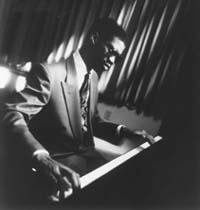


MEET MARCUS ROBERTS
MARCUS ROBERTS TELLS US ABOUT GEORGE GERSHWIN
Yeah, well Gershwin grew up during the big Harlem period. He and James P. Johnson, who created Strad piano, knew each other and respected each other. Gershwin studied with the great Ragtime pianist Roberts who taught him and James P. And of course he knew Fats who is usually seen a lot at what they call the loft sessions, which is where a lot of the great innovations of Strad piano were made. So he was known in the community as being a serious student of the instrument and of course Gershwin's biggest goal, along with writing a lot of Broadway shows, was sort of to present a bridge between jazz music and classical music so that jazz would receive a bit more of respectability among the "refined" public. That's why he wrote Rhapsody in Blue and The Concerto and some of those pieces. Yeah, he was a fine pianist, very respected among his peers.
MARCUS ROBERTS ON PLAYING THE PIANO
Well first of all, the piano is a very unique instrument because you can present it in more colorful ways, I think, than any other instrument. I've played two piano things with Ellis Marsalis. I've played solo piano. I've played in Wynton's quartet, quintet and septet. I've led some groups of my own and of course you can also play trio. These are all very special different formats. And of course there's the Big Band Lincoln Center orchestra-type setting. I think you definitely gain a whole lot from moving about in these different types of combinations. It gives you again a wide range of perspective of what the piano can do in each setting and that's of course what I am interested in. That was the premise of even my very first record, The Truth Is Spoken Here. I wanted to be what I call a complete pianist, which means you should have the full range of the history of the instrument and the history of jazz music at your disposal all the time to do what you want to do.
The ultimate goal as a jazz artist is to reinterpret it and to redefine it based on your language and your vocabulary. And you do that by using your experiences and your knowledge in music to help orchestrate your vision within the confines of what has been established before. So you have to study Ahmad Jamal if you want to play the piano in an elegant way in a trio setting. It's important to know what he did. You can't recreate it but you can certainly use it as a basis for a portion of what you're about.
HOW HE SELECTED HIS TRIO
Hurlon and Reginald were logical choices simply because we represent the core foundation of the best band that Wynton put together. We put in a lot of time over the years playing together and trying to build a vocabulary of music through the many recordings that Wynton did and some of the ones that I did. So it made sense to me. What we had'nt done was really establish what we could do as a trio alone, so I felt it was important to document our particular trio. What we represent at this particular time in history, as far as the jazz trio, has evolved through our experiences together in that band. So that's why I chose them. It's easy to play with them. We practically can read each other's minds. You know if Reginald plays something it takes me literally like .05 seconds to figure out where he's going, and vice versa. And Hurlon's the same way. And we're all from the South. We all like gumbo, we all like the same kind of food. We have a lot of similar tastes, we believe in the same thing. I think that's true musically as well as a lot of philosophical issues of life as well. I think when we play together on the stage, it's easy for us to communicate to the people sort of a uniform perspective as a unit. It would have been more difficult for me to pull off with other people at the time.
WHAT HE LEARNED FROM PLAYING WITH WYNTON MARSALIS
What you learn from being around Wynton is that he has a tremendous amount of personal strength. He has the ability to uplift literally hundreds of people. Hundreds of people I've seen uplifted as a result of dealing with him. I've seen kids come to his house. If they need somewhere to stay, he'll let them stay at his house. He's a very, very free-hearted kind of person. I know, I used to always tease him because when I first met him, he had like eighty trumpets in his house and within like two years he'd given all of them away except one. And that was the one he was playing. So he somehow managed to give away all of these trumpets to kids who needed them or people who needed them. He's just a very thorough, disciplined type of person. Anything that he's doing, he's very thorough with it and he does not take a lax attitude with any particular activity. So I learned a lot just in terms of following through and doing things properly. And if it's not right, you just have to do it again until its right. Like we had one record, Marsalis End of Time, Volume I where we went in the studio for that record like four or five times until it was how he wanted it to be. He always told me, "Make sure that your documentation is right before it hits the street because once it's there, you gotta live with it the rest of your life." He taught me a whole lot about recording, a whole lot about just presentation, and just developing your intellect and trying to really tie into as much history and development as you can. And to try to give as much of that back to people as you can. So I learned a whole lot in terms of that. And then he also got me out of just eating hamburgers and steaks every night on the road.
HIS DEFINITION OF "JAZZ"
Jazz is the feeling of democracy that we hear in any music that has blues and swing in it...the feeling of freedom. It has to have a feeling of freedom and a feeling of affirmation put in a context that would lead you down the path of sophistication. That would be my view of that.
 |
 |